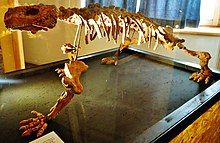Deltavjatia
| Deltavjatia Temporal range: Capitanian, [1]
| |
|---|---|

| |
| Skeleton | |
| Scientific classification | |
| Domain: | Eukaryota |
| Kingdom: | Animalia |
| Phylum: | Chordata |
| Class: | Reptilia |
| Clade: | †Parareptilia |
| Order: | †Procolophonomorpha |
| Clade: | †Pareiasauria |
| Family: | †Pareiasauridae |
| Genus: | †Deltavjatia Lebedev, 1987[2] |
| Type species | |
| †Pareiasuchus vjatkensis Hartmann-Weinberg, 1937[3]
| |
| Synonyms | |
| |
Deltavjatia is an extinct species of pareiasauromorph procolophonoid from the Tatarian stage of the Permian time period. It had a large body of about 1.5 m (4.9 ft) in length.[4] Deltavjatia was an herbivore and lived in what is now Russia.[5] The first specimen of Deltavjatia was a specimen of a skull and lower mandible (PIN 2212/1[5]), found in the Urpalov Formation in Kotelnich, Vyatka River. Since then, numerous mostly complete skeletons have been found, many of them being so well preserved due to the silty, anaerobic environment of the Kotelnich deposits that fossilised white blood cells are able to be distinguished in them.[6] Analyses of the bone histology of Deltavjatia show that they grew very rapidly during the early stages of their ontogeny but that their growth rate drastically slowed down once they reached approximately half of their full body size.[7]

Deltavjatia was placed as a subtaxon of Pareiasauridae by M.S.Y. Lee in 1997.[5]
See also
[edit]References
[edit]- ^ Vasilenko, D. V. (2005-02-11). "Feeding damage on upper Permian plants from the Sukhona River". Paleontological Journal. 41 (2): 207–211. doi:10.1134/S0031030107020116. S2CID 128417097.
- ^ "†Deltavjatia Lebedev 1987". Paleobiology Database. Fossilworks. Retrieved 17 December 2021.
- ^ Hartmann-Weinberg, A. (1937). "Pareiasauriden als Leitfossilien" [Pareiasaurids as guide fossils]. Problemy Paleontologii (in German). 213 (2–3): 649–712. (Pareiasuchus vjatkensis, p. 664; Anthodon rossicus, p. 676)
- ^ "Palaeos Vertebrates Anapsida: Pareiasauridae (2)". Palaeos.com. Retrieved 2013-10-08.
- ^ a b c "Paleobiology Database: Pareiasuchus vjatkensis". Paleodb.org. Retrieved 17 December 2021.
- ^ Kiseleva, Daria; Shilovsky, Oleg; Shagalov, Evgeny; Ryanskaya, Anastasia; Chervyakovskaya, Maria; Pankrushina, Elizaveta; Cherednichenkoa, Nadezhda (15 July 2019). "Composition and structural features of two Permian parareptile (Deltavjatia vjatkensis, Kotelnich Site, Russia) bone fragments and their alteration during fossilisation". Palaeogeography, Palaeoclimatology, Palaeoecology. 526: 28–42. doi:10.1016/j.palaeo.2019.04.015. S2CID 146631055. Retrieved 4 June 2022.
- ^ Boitsova, Elizabeth A.; Skutschas, Pavel P.; Sennikov, Andrey G.; Golubev, Valeriy K.; Masuytin, Vladimir V.; Masuytina, Olga A. (5 July 2019). "Bone histology of two pareiasaurs from Russia (Deltavjatia rossica and Scutosaurus karpinskii) with implications for pareiasaurian palaeobiology". Biological Journal of the Linnean Society. 128 (2): 289–310. doi:10.1093/biolinnean/blz094. Retrieved 4 June 2022.
External links
[edit]


